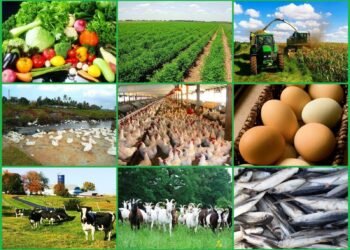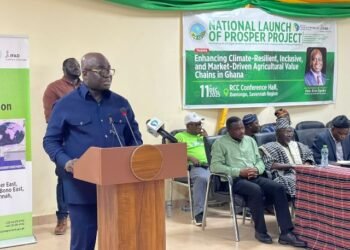Agroecology keeps gaining attention in Ghana as Eighty women farmers in Yakoti, a farming community in the Nabdam District in the Upper East Region, received a day’s training to produce organic compost for their farming activities.
The training, which aims at empowering the women to prepare their compost and move away from the use of inorganic fertilizer in their farming activities, was undertaken by a Cooperative named Maaltaaba Peasant Women Farmers’ Cooperative (MAPEWFAC)
The beneficiaries which included widows, single and teenage mothers and currently engaged in cultivating onion, tomato, cabbage, pepper, and carrot, among others, are expected to prepare their compost to apply it on their farms to increase their crop yield ostensibly.
The Cooperative secured funding from the Forest and Farm Facility (FFF) through the Food and Agriculture Organization (FAO) to support women’s ventures into tree planting to mitigate the effects of climate change.

Preparation of organic compost
Organic compost is made from cow dung, poultry manure, ashes, dried grass, and water. Firstly, a not-too-deep trench is dug, after which the cow dung, poultry, and dried grass are mixed with water simultaneously. It is then poured into the dug trench in five layers and covered for three months to mature. After three months, the compost is dug out of the trench and ready to be applied to the vegetables. A mechanized borehole was constructed to assist these women peasant farmers grow economic trees and expand their vegetable production.
In an interview, Madam Lydia M. Miyella, the founder of the Cooperative, said that their intervention was also to provide water to the beneficiary women to water trees to contribute to restoring the forest to address the issue of climate change.
“Indeed, the water we are providing for the peasant women farmers is to do three things; to water trees, irrigate their farms, and be used for their domestic activities,” says Madam Miyella. “We want to support the women to do all year-round farming to produce enough vegetables for the market to earn the needed income to better their lives,” she noted.
Testimonies from beneficiaries
Madam Baninima Tobil, a farmer for more than ten years, said the training has been an eye-opener for her as she has been well-equipped with the skills and knowledge to prepare her compost on her farm instead of spending so much money on fertilizer.
She said, “the fertilizer cost today is unbearable for the already poor women farmers. The training acquired will enable me to prepare my compost within the shortest possible time to apply it on my farm”.
Another beneficiary, Madam Dong, said with the application of the organic compost on her farm, she would be able to increase her crop yield to earn extra money to take care of the family to improve their standard of living. She said, “with the use of the organic compost on the crops, we will be able to get the natural taste of the crops and affect the health of consumers positively, unlike fertilizer induced crops which had a lot of negative health effects on consumers.”
READ ALSO: Majority of Swedes in Favour of Joining NATO























